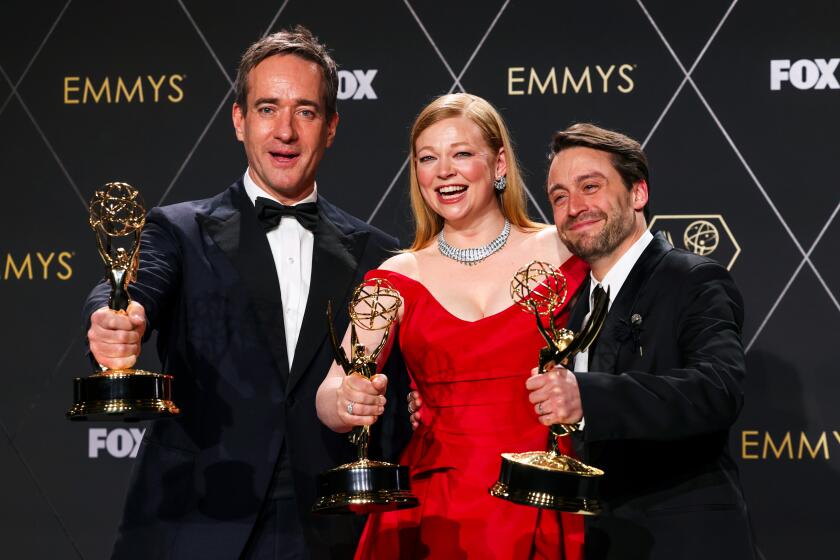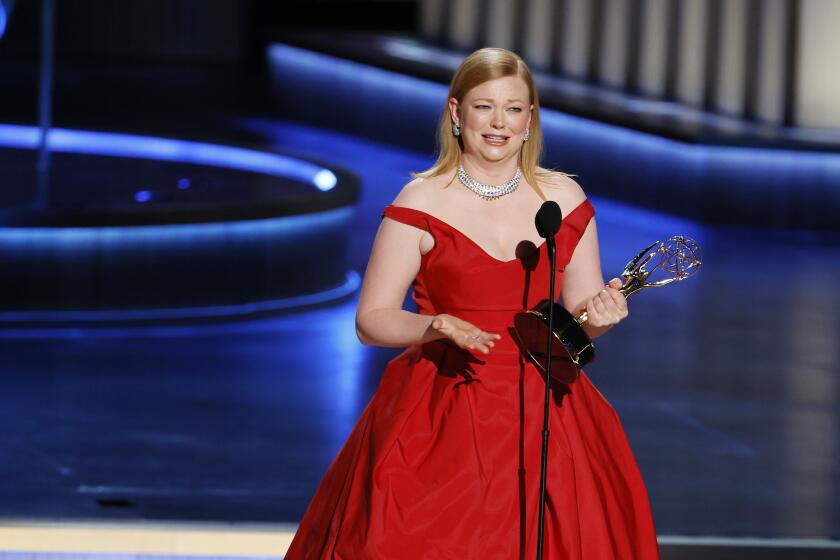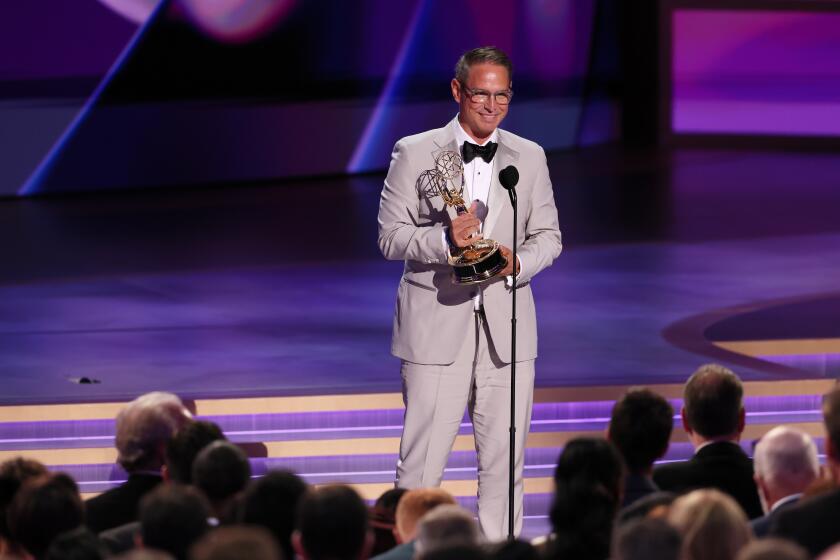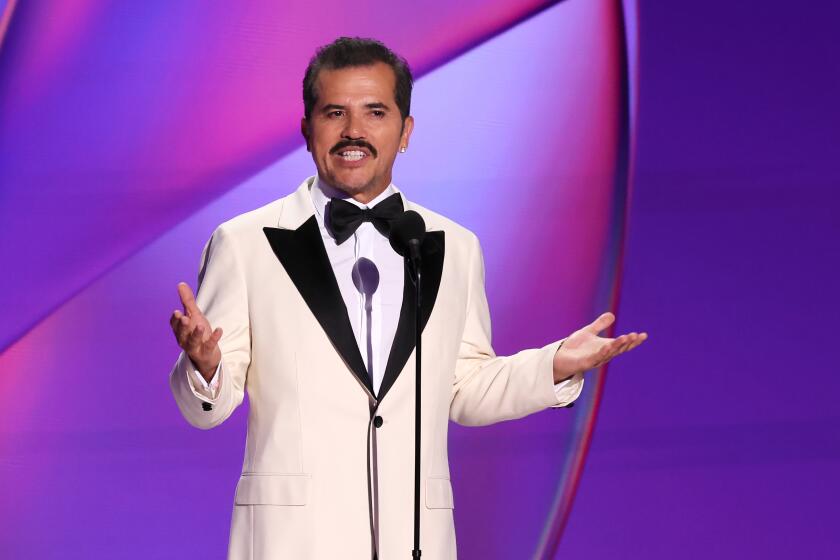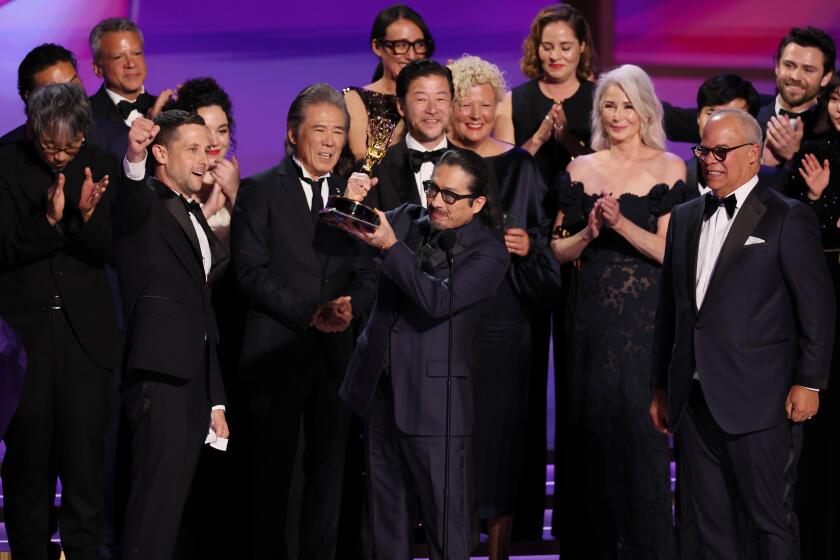Column: Soaked in nostalgia, the best Emmys in years showed how much TV has changed
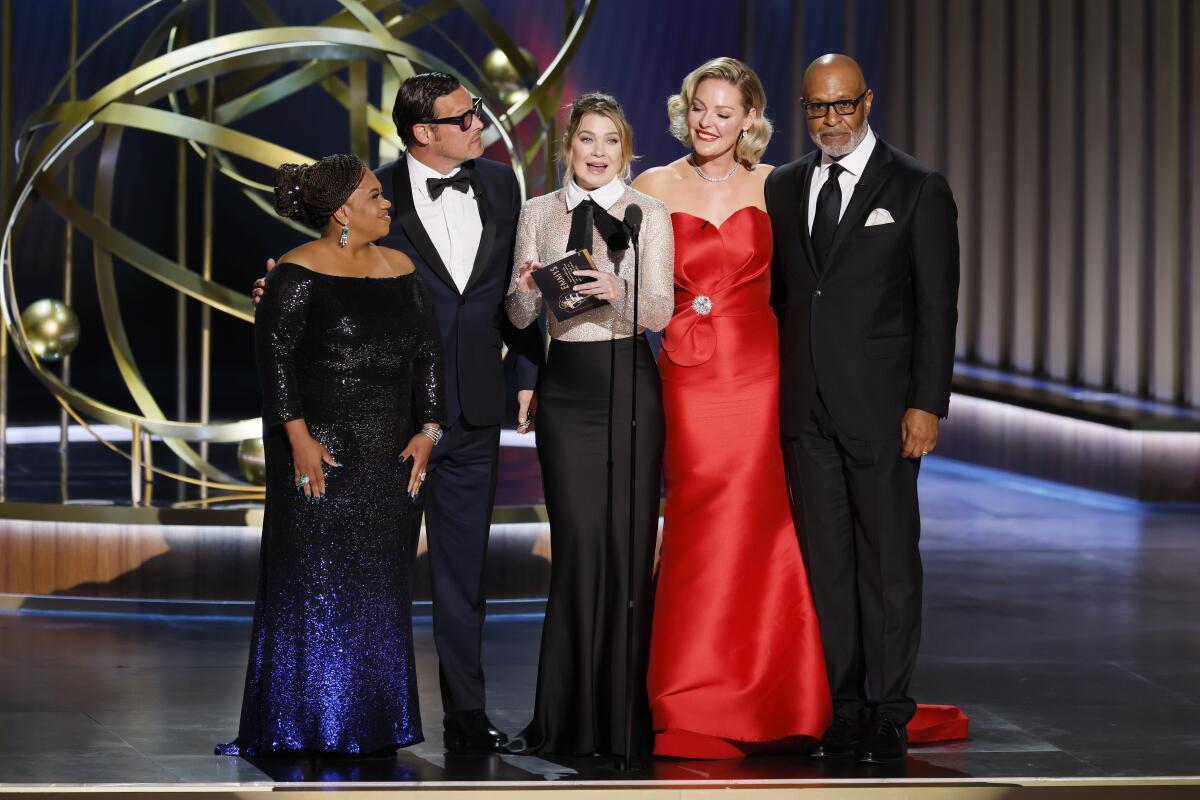
- Share via
From the moment it opened, with an homage to “Mister Rogers’ Neighborhood,” to the moment it ended, with a clip from Martin Luther King Jr.’s “I Have a Dream” speech, the 75th Emmy Awards telecast on MLK’s birthday Monday night did precisely what it should have done: Celebrate the art form known as television in all its ever-changing forms, challenges and increasing diversity.
In doing so, it created an evening that, in celebrating what we have, also reminded us of what we’ve lost. And not just in this year’s particularly heartbreaking in memoriam section.
Hosted by Anthony Anderson, who committed to perpetual enthusiasm, an ongoing bit with his mama (who called out those running over their acceptance-speech time limit) and multiple costume changes, this year’s big-anniversary show was infused with nods to, and cast reunions of, some of the best-loved shows in television history.
Often appearing on re-creations of their most famous sets, stars of “The Sopranos,” “All in the Family,” “Cheers,” “Grey’s Anatomy,” and “Ally McBeal” gathered to remember their days of glory, and offer their Emmy counts, while the casts of “Martin” and “It’s Always Sunny in Philadelphia” reminded everyone that even the most successful, long-running shows can be criminally overlooked.
“Have you been doing this every year without us?” asked Charlie Day, after it was revealed this was the first time “Sunny” had been represented in any way at the Emmys. When co-star Danny DeVito admitted that he had, in fact, won an Emmy for “Taxi,” which had received 34 nominations and 18 wins over its five-year run, Kaitlin Olson exclaimed: “34 nominations in five years versus zero nominations in 16 years? That math is bad!”
“Succession,” “Beef” and “The Bear” dominated the 75th Emmy Awards on Monday night. See the full list of winners.
The math has gotten even worse of late and the Television Academy’s recent penchant for sweeps drained some of the excitement from the actual awards — as predicted, “Succession,” “The Bear” and “Beef” walked off weighted down with trophies as the smiles from other nominated shows grew increasingly strained.
But the early presenters and winners set a tone of emotional engagement and sincerity that fed directly into the show’s theme of how important television is, and has been, to American culture. Christina Applegate, recently diagnosed with multiple sclerosis, came on with a cane to a standing ovation and quipped “body not by Ozempic.” Carol Burnett lauded the many changes in television: ”It warms my heart to see how well men are doing in comedy now.” Ayo Edebiri (“The Bear”), Quinta Brunson (“Abbott Elementary”), Jennifer Coolidge (“White Lotus”) and Niecy Nash-Betts (“Dahmer — Monster: The Jeffrey Dahmer Story”) all delivered early speeches that telegraphed the import of the moment, and of their 75-year-old prize.
Pushed from its typical September date by a six-month-long, at times vitriolic, pair of writers’ and actors’ strikes, the show maintained a surprising, welcome sweetness, in which more parents, spouses and families were thanked than agents and studio heads.
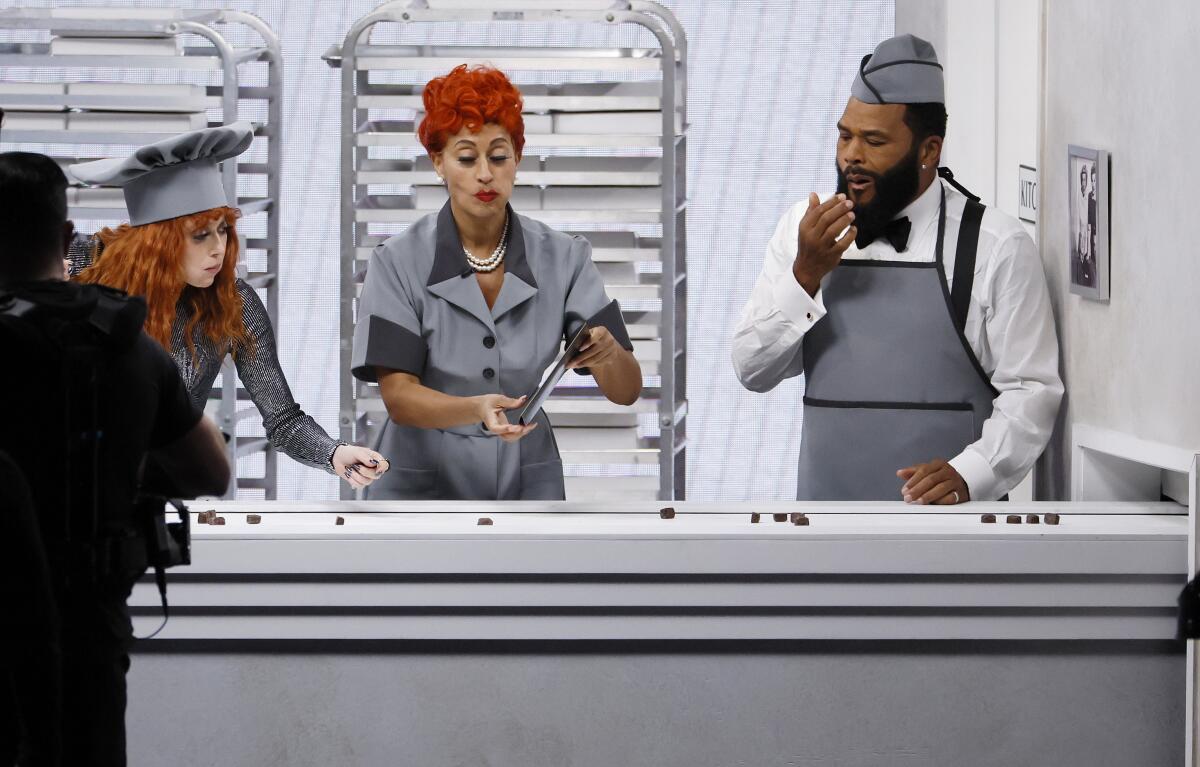
It was not without political moments, though. Nash-Betts said she was committed to giving voice to “Black and brown women who have gone unheard and over-policed.” RuPaul exhorted viewers to listen to drag queens who want to read you a story “because knowledge is power, and if someone tries to restrict your access to power, they are trying to scare you.” And “Last Week Tonight With John Oliver” writer Sofia Manfredi thanked the host and executive producers Tim Carvell and Liz Stanton “for just how much they backed us up during the writers strike — they wholeheartedly supported all of us, even though a third of us are annoying.”
Opening with a Compton choir singing the theme from “Good Times,” the show’s music leaned heavily on nostalgia, as did re-creations of “Saturday Night Live’s” “Weekend Update” by Tina Fey and Amy Poehler and the famous “I Love Lucy” chocolate factory scene by Natasha Lyonne and Tracee Ellis Ross. The result mixed the bitter with the sweet.
The Times’ Glenn Whipp, Meredith Blake and Tracy Brown break down the highlights and lowlights of the 75th Emmy Awards.
On the sweet side of the ledger, television has indisputably become more diverse in story, form and certainly representation, which was reflected in Monday’s winners, from “Beef” to “The Bear.” ”Everyone enjoying the chocolate Emmys?” Anderson asked after wins by three Black women. “We’re killing it tonight; this is like MLK Day and Juneteenth rolled up into one.”
On the bitter, seeing actors from classic broadcast shows like “Cheers,” “All in the Family,” “Good Times” and “Ally McBeal” gather to present in categories now dominated by cable and streaming underscored the passing of a TV model that helped create the very cultural touchstones being honored. Beloved as they were, those shows simply would not exist in the current landscape. Even Chandra Wilson’s announcement that “Grey’s Anatomy” is now the longest-running medical drama in television history felt poignant: Shonda Rhimes now works at Netflix, where an original, 20-plus-episode-per-season medical drama is all but anathema.
The striking contrast also made it difficult not to wonder how much staying power recent Emmy winners will have. “Succession” finished up with only 40 episodes, compared with “Game of Thrones’” 73, or “The Sopranos’” 86, let alone “Grey’s Anatomy’s” 420 (and counting). With eight episodes in its first season (for which it just won 10 Emmys) and 10 in its second, FX and Hulu’s “The Bear” will have to run for more than 25 years to catch up with “Cheers,” more than 10 to match “Good Times.” Given the recent history of cable and streaming shows, that does not seem likely.
Television, like so many areas of American culture, has become more splintered and concentrated — shows attract increasingly smaller but often more passionately devoted audiences (as reflected by Emmy voters’ recent tendency to give a few shows many awards). Even if those shows don’t hang around long enough for their theme song or opening music to be instantly recognizable decades later.
And that may be a necessary sacrifice, not just for the new economics of television but for the audience’s increasing demands for all manner of stories told about all sorts of people. For all its touching moments and occasional funny bits, this year’s Emmys offered not just a mostly delightful celebration of television but an unexpectedly clear-eyed acknowledgment of the things we leave behind as we progress.
Now, they just have to give “Sunny” a nomination or two. I mean, unlike most series that premiered in 2005, it’s still on. And that’s got to mean something.
More to Read
The complete guide to home viewing
Get Screen Gab for everything about the TV shows and streaming movies everyone’s talking about.
You may occasionally receive promotional content from the Los Angeles Times.
